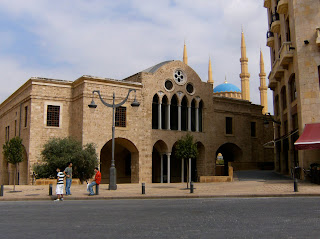Beirut is a city of contradictions. Though the locals on the street (mostly) seem as secular as can be, the governance and society here is dominated by sectarian divisions. It is a microcosm for the entire middle east.

Each community, Sunni, Shia, Maronite Catholic, Orthodox Christian, Druze and Allawi all have their own leaders who individually hold more sway than the elected government. Often these leaders provide the schools, hospitals and other infrastructure for their communities. Money and power is centrally located in the hands of a ruling elite. Lebanon is an oligarchy.
These communities are generally peaceful – though they are geographically mixed throughout the country they are insulated in their own identities. If you ask a beiruti how he or she identifies themselves, you get an answer like Lebanese Sunni or Lebanese Maronite.
The struggle for the future of Lebanon may wholly depend whether these charming and beautiful people can develop a unified national identity.
No comments:
Post a Comment